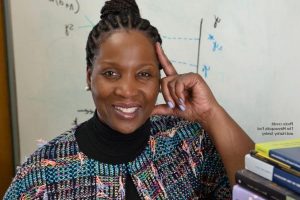Economist Lisa Cook Is The First Black Woman Named To The Federal Reserve Board Of Governors–Here’s Why That Means So Much

The Federal Reserve, or the Fed, is described as the most powerful economic institution in the country — perhaps the world. And it has largely been comprised of white men, until now.
History was made earlier this year when Lisa Cook was appointed to the Fed despite republican opposition. A professor at Michigan State, Bloomberg reported that she’d faced a united GOP campaign against her, with the top Republican on the Senate Banking Committee, Pat Toomey stating that her qualifications were “thin,” and accused her of leaning far-left in her political perspective that could politicize the central bank.
Despite the challenge, she pushed through and clenched the position.
It was reported that banking chairman Sherrod Brown vouched for Cook, stating that she has “deep experience, is sought around the world for her views on economics and would bring a diverse perspective to the Federal Reserve.”
Her appointment made history, especially as unprecedented inflation rates are plaguing the country. “High inflation is a grave threat to a long, sustained expansion, which we know raises the standard of living for all Americans and leads to broad-based, shared prosperity,” Ms. Cook said during her testimony as reported by The New York Times. “That is why I am committed to keeping inflation expectations well anchored.”
Her appointment is a lynchpin moment for ushering in an era of inclusion within the Biden administration, a core promise the President has vowed to fulfill during his tenure in office.
Cook has long spoken out and studied the impact of racial injustice on the economy, with much of her work centering the intersection of discrimination and financial prosperity of minority groups.
“Lisa has been willing to take the risk of not getting the professional plaudits she deserves by pursuing research in areas that have not been plumbed by anyone yet,” says William A. Darity Jr., a professor of economics and African American studies at Duke University in Durham, North Carolina in an interview. “People are now acknowledging the significance of her contributions.”
Source: Read Full Article
